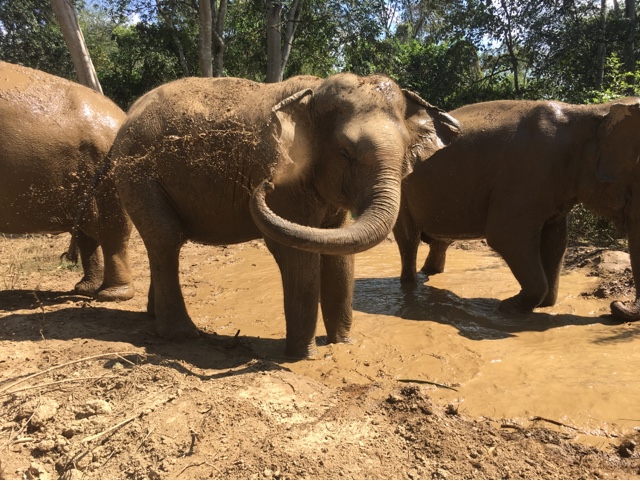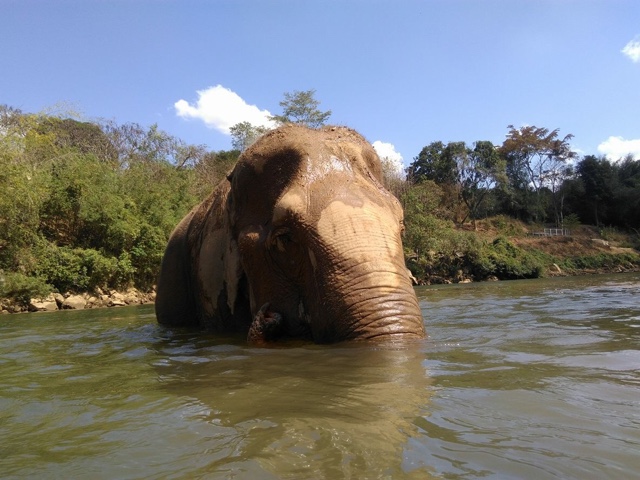“Can we wait? Your friends will come soon.” His smile was sweet as he stood there in his skirt wrap and collared shirt and I thought what choice do I have. But two hours later when we were still waiting for the plane to land, I regretted the decision. And all of this before I had even hooked up with Kath and Marie and Kristen and gotten to the hotel.
But the waiting at the airport was one thing. The hotel was entirely other. There was nothing that could have prepared me for walking into that lobby with its ornate decorations and three layer cakes and little old Burmese man playing a local marimba in the corner.
The bell hop trying to take my smelly backpack or the $30 dollar deposit for incidentals ($30?!)
I don’t know what I thought was going to happen. I should have known that this was not going to be the way I travel. That I was going to be uncomfortable with it. How could I not? Between the price of the tour and the number of questions and details via email leading up, I should have known. I should have known when the tour director told Kath that our additional meals would be $10-12 usd. In Burma? $10 should be enough to feed us lunch and dinner for a week, not for a meal!
But maybe I was just excited to have someone else plan something for me. And I did want to do a long bike trip or hike trip or something while here, so maybe it was just a way to have that happen.
But there was nothing that could have prepared me for how different this type of traveling was going to be. The hotel we stayed in last night was nothing if it wasn’t lavish. With hot water even in the sink, and a balcony leading out of the little sitting room area. But strangely, rather than luxuriating in the poshness of it all, it made me feel uncomfortable. It reminded me a bit of how I felt when we walked into that house we rented a few Christmases ago in Nicaragua. It felt wrong. Like how dare I stay in this 3 star resort with a bell hop and room service when so many people in the country are living in extreme poverty. That was certainly part of it.
And then there was this other part. This part that is about being on an organized tour and having to stay in places really designed for westerners with flush toilets and hot water and AC in the rooms. How you see a version of what the place is – which is always true when traveling, but somehow this made it feel more so. Also it harkened me back to this nagging feeling of imperialism that I haven’t been able to shake on my whole journey this year, no matter how ramshackle the accommodations and somehow the luxury of these hotels in which we will be staying just hammered it home in a more in your face sort of way. Like how dare I with my little white, western, rich privilege? My discomfort and my sense of guilt were strong upon arrival.
Something I will have to accept if I am going to at all enjoy this experience.
And after all I did agree to lay down the cost of the tour, how did I not know it was going to be like this? But yeah, not exactly my style.
So, it was a little funny when Kristen expressed her doubts as well. She and I both came to the conclusion about the trip when we realized that we weren’t going anywhere near the coast (what the heck – how are we staying away from the coast in a coastal country?), that our days would be very programmed, and that we had been trying to go on an international adventure together for essentially 15 or 20 years ourselves only to find ourselves on some sort of alternate universe where we are expected to tip our tour guide or wait for the van door to be opened to us to be carted to the next touristic destination in our air conditioned vehicle. It was surreal. It was indeed a parallel universe.
Not to say we didn’t enjoy seeing Yangon. The Shwedagon Pagoda was other worldly, with towers of gold and metal, gold and ceramic buddhas at every turn.
There were buddhas on buddhas upon buddhas and as the sun set and changed the sky from the deep sunny blue it has been all day, the orange and red mixed with the steeples making us feel like we had stepped out of the pages of a fairy tale.
The reclining buddha we had seen earlier was so huge that it was virtually impossible to get an entire photo of her, until we climbed up a little landing that had been placed at the base of her carved, gold feet expressly for that purpose.
So it wasn’t that it wasn’t cool. But maybe, if we had been on our own, instead of with Mew, our sweet tour guide, we wouldn’t have spent so much time at Aung San Suu Kyi's childhood home.
We may not have done the drive by to see the divisional high court, city hall and that pointy looking tower thing in the center of the park, and then gone to see the park with the big man made lake, but without enough time to walk around the lake or enjoy it.
We would have done what we had done earlier in the day when we had been on our own. We would have wandered around the streets and found a little food stand on the side of the road where the dishes are cleaned in a bucket and you’re not totally sure what you are being served for lunch, but it’s all delicious and you hope the man that helped you order really did manage to ask for it to be vegetarian, but you’ll never know at this point. You’d sit on low, plastic chairs and a table that looks like something out of one of your student’s’ tea parties and enjoy the rice tea and pay $1.75 for your lunch for two.
But we agreed to give it the old college try for a few days before we figure out if we have to jump ship or at least avoid some of the organized parts of the temple tours.
So even though my visions of Burma had been a land untouched by tourism, a land of monks walking the streets and greetings of “Mingalaba” by surprised locals as they saw my blonde hair float past them on their streets, I am trying to be at one with the decision that we made to come on this bike trip. The biking will surely be an amazing adventure. And a physical challenge at that. So if the rest of the tour is not the roughing it I pride myself on doing, I will have to either decide to accept that or escape what we have signed ourselves up for.
I, at the very least, needed to apologize both to Kris and to myself for not really examining what we were going to do . . . and in the end maybe to Kath and her sister in law, who are probably equally as surprised by our discomfort and lack of interest in spending the entire day learning about the temples and cultural icons for each new area.




























